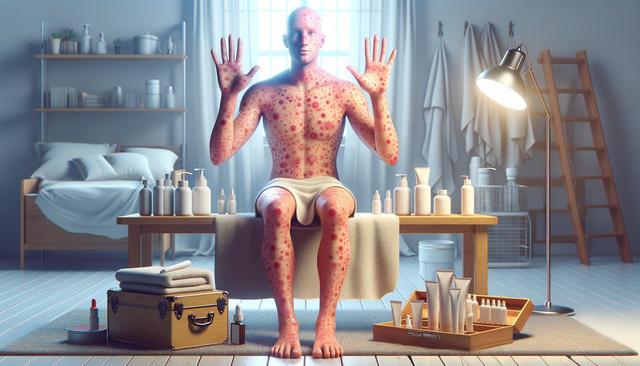What is Eczema and Why Does It Occur?
Eczema, also known as atopic dermatitis, is a chronic skin condition that causes inflammation, redness, dryness, and intense itching. It is most common in children but can affect individuals of all ages. The exact cause of eczema remains uncertain, but it is believed to be linked to a combination of genetic and environmental factors. People with eczema often have a compromised skin barrier, which makes their skin more vulnerable to irritants, allergens, and microbes.
Common triggers of eczema flare-ups include:
- Harsh soaps and detergents
- Dry weather or low humidity
- Allergens such as pollen, dust mites, and pet dander
- Stress and hormonal changes
- Certain fabrics or clothing materials
Understanding what causes flare-ups is important in managing symptoms and preventing future outbreaks. While research continues, there is no single answer to how to get rid of eczema forever, but consistent care and identifying personal triggers can significantly reduce its impact.
What Stops the Itching of Eczema?
One of the most challenging symptoms for eczema sufferers is relentless itching. This symptom can lead to scratching, which further damages the skin barrier and exacerbates the condition. So, what stops the itching of eczema? While there is no universal solution, several strategies can provide relief.
Effective methods to reduce itching include:
- Applying fragrance-free moisturizers regularly to lock in moisture
- Using cool compresses on affected areas
- Wearing breathable, cotton clothing to avoid skin irritation
- Avoiding hot showers, which can dry out the skin further
- Applying over-the-counter anti-itch creams, such as those with hydrocortisone or colloidal oatmeal
Immediate relief may also come from prescription treatments if over-the-counter options are not effective. Consulting a dermatologist can help determine the most appropriate treatment plan tailored to specific symptoms.
Immediate Relief for Eczema Itch
When experiencing a sudden flare-up, finding immediate relief for eczema itch becomes a priority. Quick intervention can prevent further skin damage and reduce discomfort. While long-term management is essential, short-term relief strategies can make a significant difference in daily life.
Some steps that can help soothe the skin quickly include:
- Applying a thick layer of emollient or a dermatologist-recommended ointment
- Using antihistamines (under medical guidance) to reduce itchiness, especially at night
- Taking lukewarm oatmeal baths to calm inflamed skin
- Using a humidifier to maintain indoor air moisture
It’s important to remember that while these methods can ease symptoms quickly, they are part of a broader approach to managing eczema effectively. Combining immediate relief techniques with a consistent skincare routine often yields better results in the long run.
How to Make Eczema Go Away Fast
Many people ask, how to make eczema go away fast, especially when symptoms interfere with daily life. While there is no instant cure, there are proactive steps that can help reduce flare-up duration and intensity. Early intervention and appropriate skincare are key.
To minimize flare-ups quickly:
- Identify and eliminate known triggers
- Follow a strict moisturizing regimen, especially after bathing
- Use medications as prescribed by a healthcare provider (e.g., topical corticosteroids or immunomodulators)
- Practice stress-reduction techniques like meditation or gentle exercise
Though symptom resolution can vary from person to person, consistency in care often results in noticeable improvements. It’s also helpful to keep a symptom diary to track what works and what doesn’t for your specific case.
Long-Term Management: Can You Get Rid of Eczema Forever?
While many seek answers to how to get rid of eczema forever, it’s important to understand that eczema is typically a chronic condition. However, with the right strategies, it can be well-managed, and flare-ups can be minimized or even prevented for long periods. The goal is to maintain healthy skin and avoid known irritants.
Long-term management tips include:
- Using gentle, non-irritating skincare products
- Staying hydrated and maintaining a healthy diet
- Managing stress and getting adequate sleep
- Following a personalized treatment plan with the guidance of a dermatologist
Some individuals experience fewer symptoms as they age, while others may have persistent eczema into adulthood. Although there is not yet a definitive cure, continuous research is expanding our understanding of eczema and developing more effective treatments over time.
Conclusion: Empowering Eczema Care Through Knowledge
Living with eczema can be frustrating, but understanding its causes and management techniques can significantly improve quality of life. From exploring what stops the itching of eczema to learning how to make eczema go away fast, each step taken toward personalized care helps reduce discomfort and build confidence in handling flare-ups. While the question of how to get rid of eczema forever remains complex, consistent routines and medical guidance offer meaningful relief. With the right tools and awareness, managing eczema becomes a journey of empowerment and improved well-being.




Leave a Reply